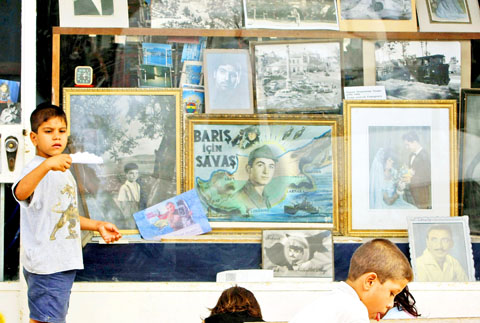Rival Cypriot leaders met yesterday for the formal launch of intensive UN-backed negotiations to reunify the divided Mediterranean island after three decades of failed diplomacy.
Both seen as pro-settlement moderates, President Demetris Christofias, a Greek Cypriot, and Turkish Cypriot leader Mehmet Ali Talat, have met five times this year in a renewed push for unity.
“Today is an historic day for Cyprus,” said UN chief Ban Ki-moon’s special envoy, former Australian foreign minister Alexander Downer, who was at the launch of the talks in the UN-patrolled buffer zone of Nicosia.

PHOTO: AP
Downer said “significant progress” had been made to build confidence and create a solid foundation for the negotiations, which mark the first major push for peace on the island since a failed UN peace plan in 2004.
“There have been difficult moments over the past months and there will likely be further difficulties and challenges ahead. At the same time, the Cyprus problem is not insurmountable and the negotiations which begin today can and must have a successful outcome,” he said.
The negotiation process has an open-ended timeline but the UN has warned that the talks can not go on indefinitely without tangible progress.
The buildup to the talks has been clouded by the refusal of Turkish Cypriot authorities to allow Greek Cypriot pilgrims to travel via a town in the northwest of the island to attend a church service.
However, hundreds of Turkish- and Greek-Cypriot peace activists rallied on Monday night in the capital’s buffer zone chanting for a reunified Cyprus.
Talat, meanwhile, has raised the possibility of a settlement by the end of this year.
“It depends on the Greek-Cypriot side, if they have the will I am sure we can find a solution by the end of the year,” he said on Monday.
He insisted that any deal would have to provide for two politically equal “constituent states,” a concept which has been anathema to the Greek-Cypriot community which makes up more than 80 percent of the island’s population.
Preparatory talks at committee level since March have been accompanied by confidence-building measures, notably the opening of a crossing in Ledra Street linking south and north in the symbolic heart of old Nicosia.
It is the first intensive push for peace since a UN reunification plan was approved by Turkish Cypriots but overwhelmingly rejected by Greek Cypriots, just a week before the island joined the EU in 2004.
Optimists are pinning their hopes on the personal chemistry and shared left-wing politics of the two leaders.
Christofias was elected in February on a platform of relaunching peace efforts. Talat led the Turkish Cypriot “yes” vote in 2004.
Any agreement the leaders reach will then have to be sold to the two communities in simultaneous referendums.
Cyprus has been divided since 1974 when tens of thousands of Turkish troops occupied its northern third in response to an Athens-engineered Greek Cypriot coup seeking union with Greece.

Nauru has started selling passports to fund climate action, but is so far struggling to attract new citizens to the low-lying, largely barren island in the Pacific Ocean. Nauru, one of the world’s smallest nations, has a novel plan to fund its fight against climate change by selling so-called “Golden Passports.” Selling for US$105,000 each, Nauru plans to drum up more than US$5 million in the first year of the “climate resilience citizenship” program. Almost six months after the scheme opened in February, Nauru has so far approved just six applications — covering two families and four individuals. Despite the slow start —

YELLOW SHIRTS: Many protesters were associated with pro-royalist groups that had previously supported the ouster of Paetongtarn’s father, Thaksin, in 2006 Protesters rallied on Saturday in the Thai capital to demand the resignation of court-suspended Thai Prime Minister Paetongtarn Shinawatra and in support of the armed forces following a violent border dispute with Cambodia that killed more than three dozen people and displaced more than 260,000. Gathered at Bangkok’s Victory Monument despite soaring temperatures, many sang patriotic songs and listened to speeches denouncing Paetongtarn and her father, former Thai prime minister Thaksin Shinawatra, and voiced their backing of the country’s army, which has always retained substantial power in the Southeast Asian country. Police said there were about 2,000 protesters by mid-afternoon, although

MOGAMI-CLASS FRIGATES: The deal is a ‘big step toward elevating national security cooperation with Australia, which is our special strategic partner,’ a Japanese official said Australia is to upgrade its navy with 11 Mogami-class frigates built by Japan’s Mitsubishi Heavy Industries, Australian Minister for Defence Richard Marles said yesterday. Billed as Japan’s biggest defense export deal since World War II, Australia is to pay US$6 billion over the next 10 years to acquire the fleet of stealth frigates. Australia is in the midst of a major military restructure, bolstering its navy with long-range firepower in an effort to deter China. It is striving to expand its fleet of major warships from 11 to 26 over the next decade. “This is clearly the biggest defense-industry agreement that has ever

DEADLY TASTE TEST: Erin Patterson tried to kill her estranged husband three times, police said in one of the major claims not heard during her initial trial Australia’s recently convicted mushroom murderer also tried to poison her husband with bolognese pasta and chicken korma curry, according to testimony aired yesterday after a suppression order lapsed. Home cook Erin Patterson was found guilty last month of murdering her husband’s parents and elderly aunt in 2023, lacing their beef Wellington lunch with lethal death cap mushrooms. A series of potentially damning allegations about Patterson’s behavior in the lead-up to the meal were withheld from the jury to give the mother-of-two a fair trial. Supreme Court Justice Christopher Beale yesterday rejected an application to keep these allegations secret. Patterson tried to kill her